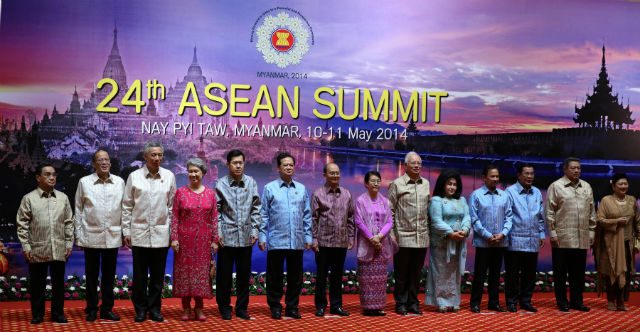SUMMARY
This is AI generated summarization, which may have errors. For context, always refer to the full article.

NAY PYI TAW, Myanmar (3rd UPDATE) – Surging maritime tensions dominated a meeting of Southeast Asian leaders Sunday, May 11, with Vietnam expected to call on its regional neighbors for support in its deepening territorial dispute with China.
The 10-member Association of Southeast Asian Nations (ASEAN) is convening just days after both Vietnam and the Philippines locked horns with China in contested waters, stoking international alarm.
The summit, hosted for the first time by Myanmar in its showpiece capital Naypyidaw, is set to be dominated by discussion of the South China Sea, which is crisscrossed by key shipping lanes and thought to contain vast energy reserves.
In prepared remarks for the summit seen by Agence France-Presse, Vietnam Prime Minister Nguyen Tan Dung urged his ASEAN counterparts to protest what he termed China’s “serious violation” in the sea.
Tensions flared after a controversial decision by Beijing to relocate a deep-water oil rig into territory also claimed by Hanoi in early May.
The move sparked a series of incidents in the disputed waters, with Vietnam on Wednesday accusing its neighbor of attacks on its ships.
“This extremely dangerous action has been and is directly threatening peace, stability and maritime security and safety,” Dung said, according to the prepared remarks.
In a declaration on the formation of an ASEAN community by 2015, the ASEAN leaders reaffirmed their commitment “to strengthen cooperation for the full and effective implementation of the DOC (Declaration of Conduct) in the South China Sea.”
Serious concern
On Saturday, ASEAN foreign ministers expressed “serious concerns over the on-going developments” in a joint statement ahead of the summit, as the bloc sought to present a unified front in dealing with the region’s massive neighbor.
The stand-off has stoked bitter anti-China sentiment in Vietnam, with about 1,000 people joining one of the country’s largest ever rallies against Beijing in Hanoi on Sunday. Protests also broke out in two other major Vietnamese cities.
China and Vietnam, who fought a brief border war in 1979, frequently trade diplomatic barbs over oil exploration, fishing rights and the Spratly and Paracel Islands.
Vietnam’s communist regime, which is wary of public gatherings that could threaten its authoritarian rule, has alternated between tolerating anti-China rallies and violently breaking them up.
Exercise ‘utmost restraint’
UN Secretary General Ban Ki-moon called on both countries to “exercise the utmost restraint” in the sea, United Nations deputy spokesman Farhan Haq said Friday.
Observers have said Beijing’s decision to move the rig could have been a tit-for-tat response to a visit to the region by US President Barack Obama, who reaffirmed support for Asian allies the Philippines and Japan, which is locked in its own maritime territorial dispute with China.
Beijing claims sovereign rights to almost the whole of the South China Sea.
The Philippines and Vietnam are China’s most vocal critics within Southeast Asia.
But the South China Sea is also claimed in part by ASEAN members Brunei and Malaysia as well as Taiwan.
Manila, which has asked a UN tribunal to rule on China’s claims over most of the sea, also said on Wednesday it had detained a Chinese fishing boat in disputed territory.
Philippine President Benigno Aquino Saturday urged fellow Southeast Asian leaders to face up to the threat posed by China’s increasing assertiveness in the sea, stressing that it affected regional security.
“We stand firm in our belief — a belief shared by all — that the rule of law is key in fostering a climate of stability, one that allows our societies and our peoples to flourish,” Aquino said.
Beijing prefers to negotiate directly with its smaller, weaker neighbors on a bilateral basis, a policy that is rejected by rival claimants.
The other ASEAN members are Cambodia, Indonesia, Laos, Myanmar, Singapore and Thailand.
Myanmar’s chairmanship is the first time it has taken the helm of ASEAN, despite having been a member for 17 years, as concerns about the rights record of the former junta kept the country on the sidelines.
But reforms under a quasi-civilian regime that came to power in 2011 have burnished the country’s international standing and seen the removal of most Western sanctions.
ASEAN suffered a serious knock to its credibility in 2012 during Cambodia’s chairmanship of the group when foreign ministers failed to issue a joint communique at their annual meeting for the first time in the bloc’s history because of deep divisions on the South China Sea issue.
The Philippines at that time blamed Cambodia, a key Chinese ally, for the fiasco.
Thailand’s contribution to the summit will be overshadowed by the removal of Thai premier Yingluck Shinawatra from office for abuse of power in a recent court ruling that drew both pro- and anti government protesters onto the streets. – Rappler.com
Add a comment
How does this make you feel?
There are no comments yet. Add your comment to start the conversation.